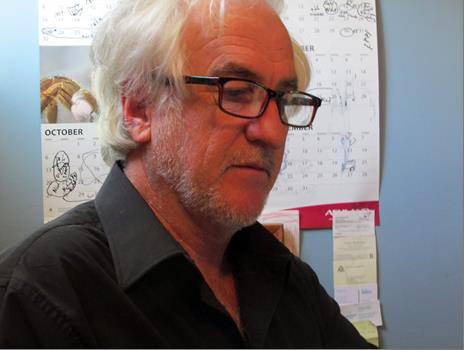In the fifth grade Andy Flanagan, author of How I “Laerned” to Read, was asked to tell a story in front of his class. He told the story. The class clapped. The teacher gave him an A+. But something was wrong. The paper was blank. Flanagan couldn’t read, so he made the story up on the spot.

Dyslexia is a language-based learning disability. It’s a lifelong challenge that can hinder people’s ability to read, write, spell or even speak, according to the National Center for Learning Disabilities.
“The first four years of school I was oblivious that I even had a problem,” said Flanagan, of Belledune, N.B. “I thought the rest of the world had some kind of problem. I didn’t.”
Flanagan says he was always good at telling stories, so his teacher passed him along. It wasn’t until the ninth grade that his parents tried to figure out what was wrong.
“Back in the sixties nobody knew what dyslexia was. If you weren’t reading you were just stupid,” said Flanagan. “I carried that embarrassment about dyslexia all my life.”
Flanagan said it wasn’t until last year that he decided to write How I “Laerned” to Read. He was still contemplating whether or not people would think he was stupid.
“That’s why I think it’s important for me to talk about it more than anything,” said Flanagan.
Flanagan’s book was e-published on Nov. 25. Flanagan first learned to read in the ninth grade while learning to cope with dyslexia. After he failed twice, his parents decided to send him away to the Bishop’s College School in Lennoxville, Quebec. That’s where he read his first book.
“People have to understand that they have to develop coping mechanisms. For some people like me, you just have to take a longer way around learning how to read,” said Flanagan.
In order for Flanagan to learn to read he had to focus to keep the letters from moving around. He can only process three letters at a time. The longer the word the longer it takes him.
“After a while I became very good at it, and ended up being almost able to read normal.”
He spent eight weeks at a reading summer camp. He read his first two books there. After that, he excelled. He went on to write several short stories and manuscripts.
“Just keep preserving; you’re going to figure out those coping techniques. And then you can read all the books you want,” said Flanagan. “You just have to figure it out in your own head, how you’re going to read.”
Flanagan hopes his story will cause people to be more accepting of dyslexia. He also hopes that those struggling with it won’t get embarrassed about it but will work hard to learn to read.
“You shouldn’t be ashamed of it. Just work with it.”
